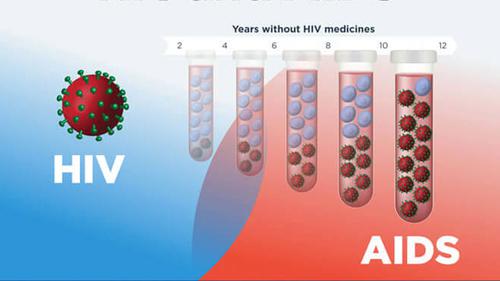HIV VS AIDS - A Comparative Study!
A human body is having a very complex yet very effective system working to protect the body. There are some systems in the body which are working to defend the body against all types of illness. Among these, HIV still seizes people's attention these days and the latest figures are quite shocking. In 2017 about 1 million people died due to HIV infection. These cases are quite a few than the previous year, even when the situation is alarming. The disease was first identified during the 1980s and till now it has caused almost 35 million deaths.
People are sometimes confused between HIV and AIDS, this article gives a comparative study of these two terms. The main difference between HIV and AIDS is discussed below:
- HIV is a virus and attacks the immune system of the body which is the only defense in the body against illness. It breaks the white blood cells from the body and replaces them with copies which eventually destroy the immune system.
- AIDS, on the other hand, is not a virus itself but one stage of HIV on which the disease has developed to be more serious. When the immune system of the body becomes weak and cannot fight the infections, they are said to be under the attack of AIDS. They are indeed some of the very serious diseases one could have, so rush to your doctor as soon as you suspect of having it.

Different Stages of HIV, HIV and AIDS
HIV (Human Immunodeficiency Virus) is actually a virus and with the passage of time, it destroys the immune system and completely acquires it by making its copies. Different stages of HIV are explained below.
1. Acute HIV infection
Most people are not aware of the disease until the immune system fights it, which is after 2 to 6 weeks after the attack. This stage is known as an acute retroviral syndrome. The symptoms at this stage are quite similar to that of the flu. These symptoms stay for a week or two and then go away. During this stage, you may experience fever, headache, fatigue, sore throat, aching muscles, diarrhea, vomiting, and nausea. Doctors can help you if the disease is in its initial stages, and it could be treated.
2. Chronic HIV infection
When the immune system loses to the HIV, the symptoms mentioned above will go away. Most people don't have the symptoms which others can see or feel and they may not realize they pass the HIV to others as well. This stage of HIV can last up to 10 years and even more.
If HIV is untreated during this phase it will be killing the CD4 T-cells from the body and destroying the immune system. Your doctors can check it with blood tests. When the number of these cells drops you become vulnerable to all the diseases.
Combination of some medications can treat the disease in the stage and rebuild your immune system as well. Proper medications and healthy habits can also prevent the virus from further progress in the body.
3. Final stage: AIDS
The third stage is the most advanced stage of HIV infection and is known as AIDS. When the number of CD4 T-cells drops below the number of 200. This will contribute to the destruction of the immune system during this process. The result is that it makes the body vulnerable to diseases and get them more easily, like tuberculosis, pneumonia, toxoplasmosis, cancer and oral thrush.
Some of the symptoms you may feel are tired all the times, fever which lasts for more than 10 days, sweating during the night, sudden weight loss, long-lasting diarrhea and yeast infection in throat, mouth or vagina. People who are not using proper medication don't last even 3 years. This can be cured as well if you are having an AIDS-defining illness such as lung disease or any form of skin cancer. So applying proper medication can lead to a healthy life.
Diagnose
This disease can be diagnosed by testing the saliva and blood for the antibodies to the virus. The body usually takes up to 12 weeks to develop in it.
CD4 T cell count. This is the test which is mostly used to diagnose the HIV. CD4 T is actually white blood cells which are destroyed by the HIV and copied to destroy the immune system of the body. Some other diagnoses which can be used to identify the AIDS are drug resistance and viral load (HIV RNA).
Causes and Spreading
It spreads through blood infection. There are many ways you may get it. HIV spread when you have sex with someone who is infected with HIV and don't use a condom or other medicines to prevent the spreading of the virus. It also spread if you share needles or syringes, rinse water and other types of equipment which is used for the preparation of drugs for the injections of an infected person. It spread from mother to child as well during birth, pregnancy, and breastfeeding. Oral sex can also lead to HIV, putting one's mouth on the anus, vagina, and penis. This is very rare but if your partner is infected, this can be the reason for spreading HIV. Blood transfusion, tissue transplant, and blood products which are contaminated with HIV can spread HIV.
Preventions
The most important thing is to know how the disease spread and having complete information on how to prevent it ahead. And here are some practical methods which can be used to avoid HIV.
- Proper usage of a condom during sex.
- Take care while using needles and other sharp instruments for injuries.
- Immediately wash body parts containing blood or other fluids with visible blood.
- Use protective barriers to avoid exposure to blood and other fluid containing blood.

Treatments
There is no exact cure for the disease so far in the world. However, there are few drugs which can help to control the virus of the disease.
Non-nucleoside reverse transcriptase inhibitors (NNRTIs). This treatment will turn off the protein which HIV uses to make the copies of white blood cells. Some of the inhibitors include nevirapine, etravirine, and efavirenz.
Integrase inhibitors. There is a protein which is known as integrase, which disables the protein which inserts a genetic material into CD4 T cells. Some of the examples of such inhibitors include dolutegravir and raltegravir.
HIV is still dangerous these days, but it can be restricted by taking proper precautionary measures. Now have you got the difference between AIDS and HIV if not, this video is for further information:
YOU MAY LIKE
-
Myth or Fact: Does Being Cold Make You Sick?
-
Is Possible to Get Allergic to Marijuana?
-
8 Best Ways to Get Rid of Pinworms
-
What Happens to Your Body When You Have HIV
-
How Long Does a Cold Last? A Few Days, One Week or More?
-
How Long Is a Cold Contagious: Symptoms and Tips
-
How Long Does Shingles Last? Things You Must Know
-
Hepatitis C: Transition and Treatment
-
Cure a Sore Throat and Earache: Causes and Home Remedies
-
How Long Will HIV Symptoms Show Up After You Get It?
